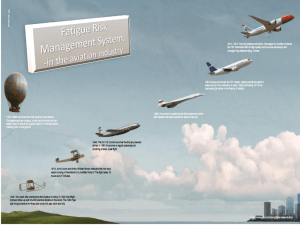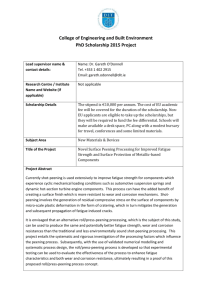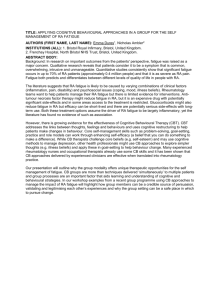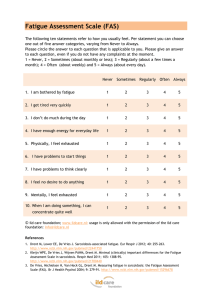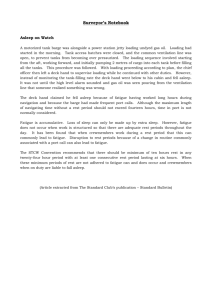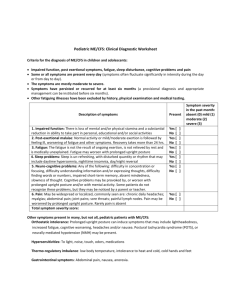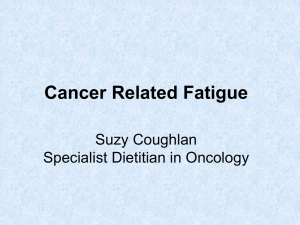ii. Title: Physical activity as an intervention to reduce fatigue in
advertisement
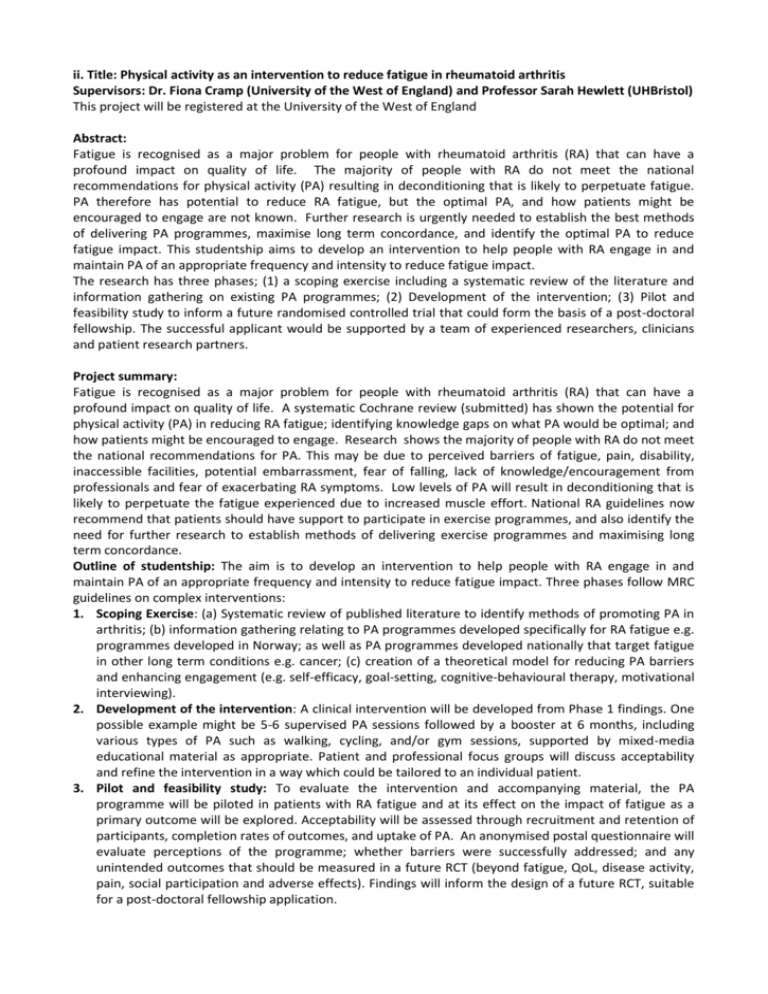
ii. Title: Physical activity as an intervention to reduce fatigue in rheumatoid arthritis Supervisors: Dr. Fiona Cramp (University of the West of England) and Professor Sarah Hewlett (UHBristol) This project will be registered at the University of the West of England Abstract: Fatigue is recognised as a major problem for people with rheumatoid arthritis (RA) that can have a profound impact on quality of life. The majority of people with RA do not meet the national recommendations for physical activity (PA) resulting in deconditioning that is likely to perpetuate fatigue. PA therefore has potential to reduce RA fatigue, but the optimal PA, and how patients might be encouraged to engage are not known. Further research is urgently needed to establish the best methods of delivering PA programmes, maximise long term concordance, and identify the optimal PA to reduce fatigue impact. This studentship aims to develop an intervention to help people with RA engage in and maintain PA of an appropriate frequency and intensity to reduce fatigue impact. The research has three phases; (1) a scoping exercise including a systematic review of the literature and information gathering on existing PA programmes; (2) Development of the intervention; (3) Pilot and feasibility study to inform a future randomised controlled trial that could form the basis of a post-doctoral fellowship. The successful applicant would be supported by a team of experienced researchers, clinicians and patient research partners. Project summary: Fatigue is recognised as a major problem for people with rheumatoid arthritis (RA) that can have a profound impact on quality of life. A systematic Cochrane review (submitted) has shown the potential for physical activity (PA) in reducing RA fatigue; identifying knowledge gaps on what PA would be optimal; and how patients might be encouraged to engage. Research shows the majority of people with RA do not meet the national recommendations for PA. This may be due to perceived barriers of fatigue, pain, disability, inaccessible facilities, potential embarrassment, fear of falling, lack of knowledge/encouragement from professionals and fear of exacerbating RA symptoms. Low levels of PA will result in deconditioning that is likely to perpetuate the fatigue experienced due to increased muscle effort. National RA guidelines now recommend that patients should have support to participate in exercise programmes, and also identify the need for further research to establish methods of delivering exercise programmes and maximising long term concordance. Outline of studentship: The aim is to develop an intervention to help people with RA engage in and maintain PA of an appropriate frequency and intensity to reduce fatigue impact. Three phases follow MRC guidelines on complex interventions: 1. Scoping Exercise: (a) Systematic review of published literature to identify methods of promoting PA in arthritis; (b) information gathering relating to PA programmes developed specifically for RA fatigue e.g. programmes developed in Norway; as well as PA programmes developed nationally that target fatigue in other long term conditions e.g. cancer; (c) creation of a theoretical model for reducing PA barriers and enhancing engagement (e.g. self-efficacy, goal-setting, cognitive-behavioural therapy, motivational interviewing). 2. Development of the intervention: A clinical intervention will be developed from Phase 1 findings. One possible example might be 5-6 supervised PA sessions followed by a booster at 6 months, including various types of PA such as walking, cycling, and/or gym sessions, supported by mixed-media educational material as appropriate. Patient and professional focus groups will discuss acceptability and refine the intervention in a way which could be tailored to an individual patient. 3. Pilot and feasibility study: To evaluate the intervention and accompanying material, the PA programme will be piloted in patients with RA fatigue and at its effect on the impact of fatigue as a primary outcome will be explored. Acceptability will be assessed through recruitment and retention of participants, completion rates of outcomes, and uptake of PA. An anonymised postal questionnaire will evaluate perceptions of the programme; whether barriers were successfully addressed; and any unintended outcomes that should be measured in a future RCT (beyond fatigue, QoL, disease activity, pain, social participation and adverse effects). Findings will inform the design of a future RCT, suitable for a post-doctoral fellowship application.
